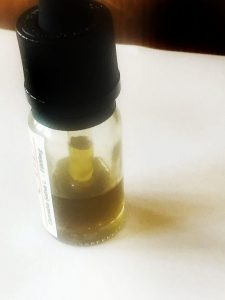British Grandmother claims cannabis oil drastically reduced cancerous tumour
- Lin Coxon refused chemotherapy for her cancer treatment, instead opting to use CBD oil
- Her case is now being studied by experts to see if cannabis can help prevent bad cells communicating
- Cannabidiol is a non-psychoactive chemical present in cannabis
A British grandmother, and personal assistant to South Derbyshire MP Heather Wheeler, has claimed that cannabis oil has helped dramatically shrink a malignant tumour discovered in her breast.
Lin Coxon, 69, from Derby, was initially told by doctors at the Royal Derby Hospital that the tumour had invaded nearby lymph nodes and muscle, and was a terrifying 33mm in size.
Now Lin’s case is being studied by medical researchers to see if it can offer hope to others battling cancer.
Doctors recommended Lin receive eight rounds of chemotherapy, followed by a lumpectomy and the removal of all the lymph nodes. This would have been followed by further radiotherapy. Lin, however, decided to begin her own research on the condition, discovering success stories where cancer patients had successfully managed to treat their cancer with cannabinoids.
The grandmother came across Karen Roberts, an ASDA workers who had had recent success treating her cancer with cannabis.
Lin was advised by Karen on which oil to buy: Cannabidiol (CBD) oil. CBD is non-psychoactive (doesn’t get you “high” like THC) and is legal to purchase in the UK. She began her CBD treatment while waiting for her chemotherapy to stat.

The cannabis was so successful at reducing the size of the tumour that the Grandmother-of-10 was able to forgo any further medical treatments.
“Going public with this was a big decision but I do not feel I can morally keep this to myself any longer.”
– Lin Coxon
Discussing the amazing results the cannabis had on her cancer, Lin said:
“I was diagnosed on June 28 (2017) and obviously, it was a major shock.
“I did some reading in the days that followed and saw there were reports that cannabis oil, which is available as a food supplement, could have beneficial effects so I decided I had nothing to lose.
“By July 24 I could not feel the tumour, before it had felt hard.
“With my chemotherapy due to start on August 23, I asked if I could have another scan but the hospital said no, so my GP suggested I had it done privately which I did on August 21.
“The doctor at the Nuffield Hospital was staggered when he saw the tumour had shrunk from 33mm to 11mm and my lymph nodes had gone from 25mm to 10mm.
“He did a mammogram and saw the whole density had changed which was amazing news, so as it was shrinking so dramatically I spoke to my consultant and deferred the chemotherapy.
“I am still taking the cannabis oil and the tumour is still shrinking and is now down to 7mm with no medical treatment and the lymph nodes are down to 4mm.
“The clinician at the Royal Derby said I should still have chemotherapy but I said I didn’t want to as things were moving in the right direction. I asked my consultant if he would still be happy to monitor me and he said he would.

“Going public with this was a big decision but I do not feel I can morally keep this to myself any longer.
“I cannot say cannabis oil will work for anyone else but my experience would seem to show it is worth trying.
“I feel people have nothing to lose especially if they are waiting for chemotherapy.”
CBD is currently classified as a “food supplement,” and is available for private purchase. Lin purchased her CBD oil from a private company, as the treatment is not currently available on the NHS (except in rare cases, such as Billy Cadwell’s).
The grandmother claims a £39 bottle will last her 10 days.
Lin’s case has become so prolific that researchers at St. George’s, University of London, who are already investigating the potential medical properties of cannabinoids, have been in contact with the grandmother.
Dr Wai Liu, senior research fellow at St George’s, explained why his team had begun investigating Lin’s case: “I was very interested to hear of Lin’s case.
“Cannabidiol, which is just one element of the cannabis plant and one that does not have any psychoactive effect on people, has been shown to target communication signals that are malfunctioning in cancer cells.
“It is thought that by correcting these signals we can enable cancer cells to essentially die rather than duplicate. So it may hold the key to understanding how to defeat cancer in some areas.
“We at St George’s, University of London, have shown how this can be done. Although our data has mainly been laboratory-based, we have a growing and large collection of testimony from patients using cannabidiol, usually in a cannabis oil type product, who report positive effects on their battle with this dreadful disease.
“Lin’s story is one that adds to this growing list and we wish her all the best in her treatment which should always be under the supervision of her doctors.”
Research into cannabinoids has been heavily restricted in the UK, due to cannabis’ Schedule I status, which means the British Government view it as having no known medicinal benefits.
The only way further research can be conducted is by removing this Scheduling. Currently, research on THC can only be conducted if it is to investigate any potential harms.
Would you break the law to try and save your life?

I was diagnosed with lung cancer in Aug which they say probably had 12 months at least with no symptoms, family and friends have givrn me Cannabis gel in syringe which I take every evening and been on firt a while, started off eith rice sized piece on finger now double, not haloucinery dont feel I’ve had anything, vety interested in this ladusy atyicle with her success wondering if ehat I am taking might do same as I am tempted to go buy the same as her, as you can imagine I will yry anything as if I have Chemo wjich I don’t want maybr looking at 12 months without 6 months, hope you can help, coz dont know really what I’m doing with it, thanks
The oil you have been given could contain little or no cannabinoids. Did you purchase it off a trusted person, or someone you did not know?
The oil which Mrs. Coxon took was CBD oil, which can legally be purchased anywhere in the UK.
If you go to United Patient’s Alliance’s Facebook page (https://www.facebook.com/unitedpatientsalliance/), they are currently offering a great range of discounts on CBD products.
If you would like more detailed advice on cannabis oil, please feel free to email in at miles@medicalmarijuana.co.uk
It is high time researchers do a more thorough analysis to bring canabis oil mainstream for treatment of cancer. My prayers are with her.